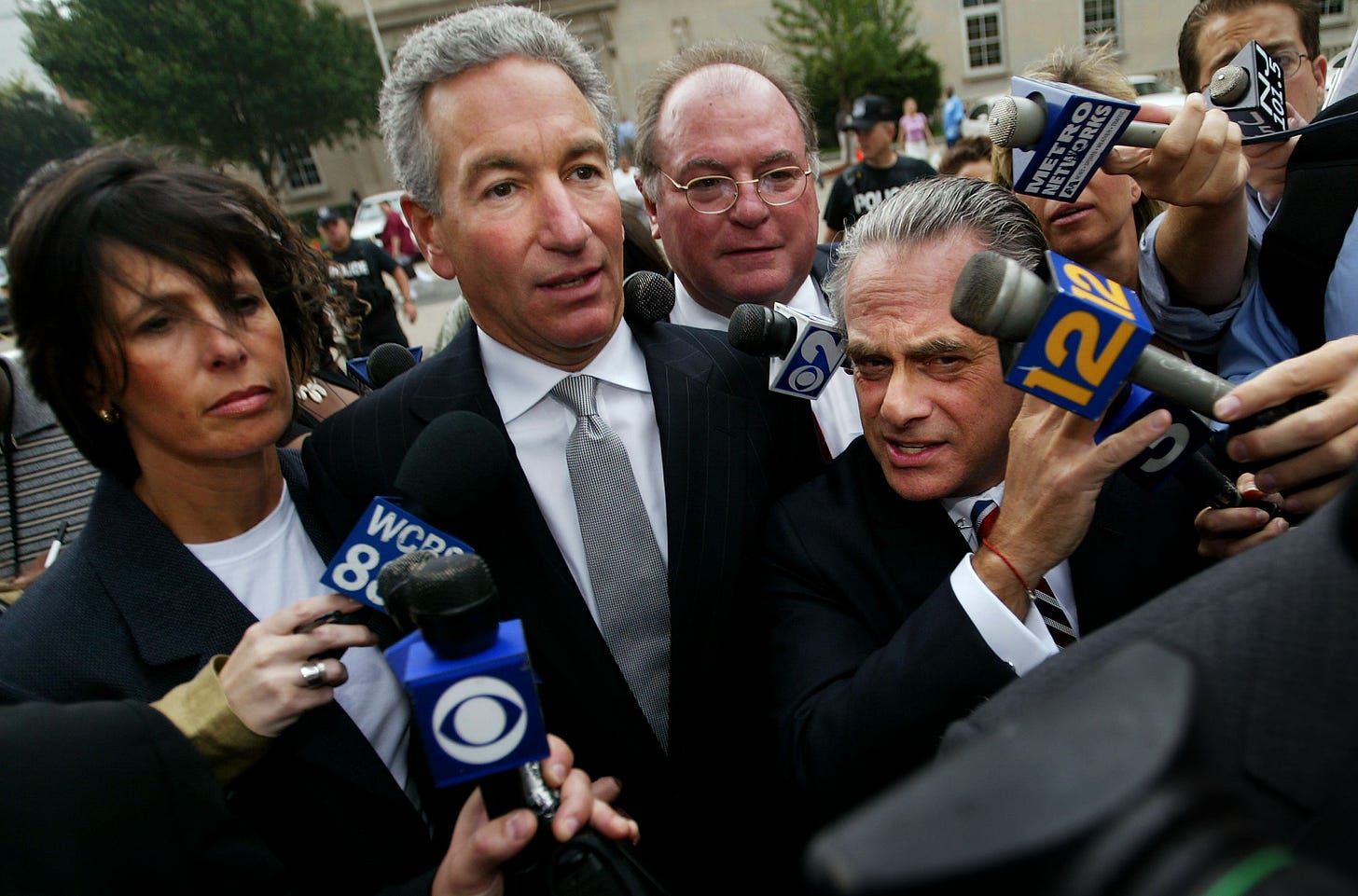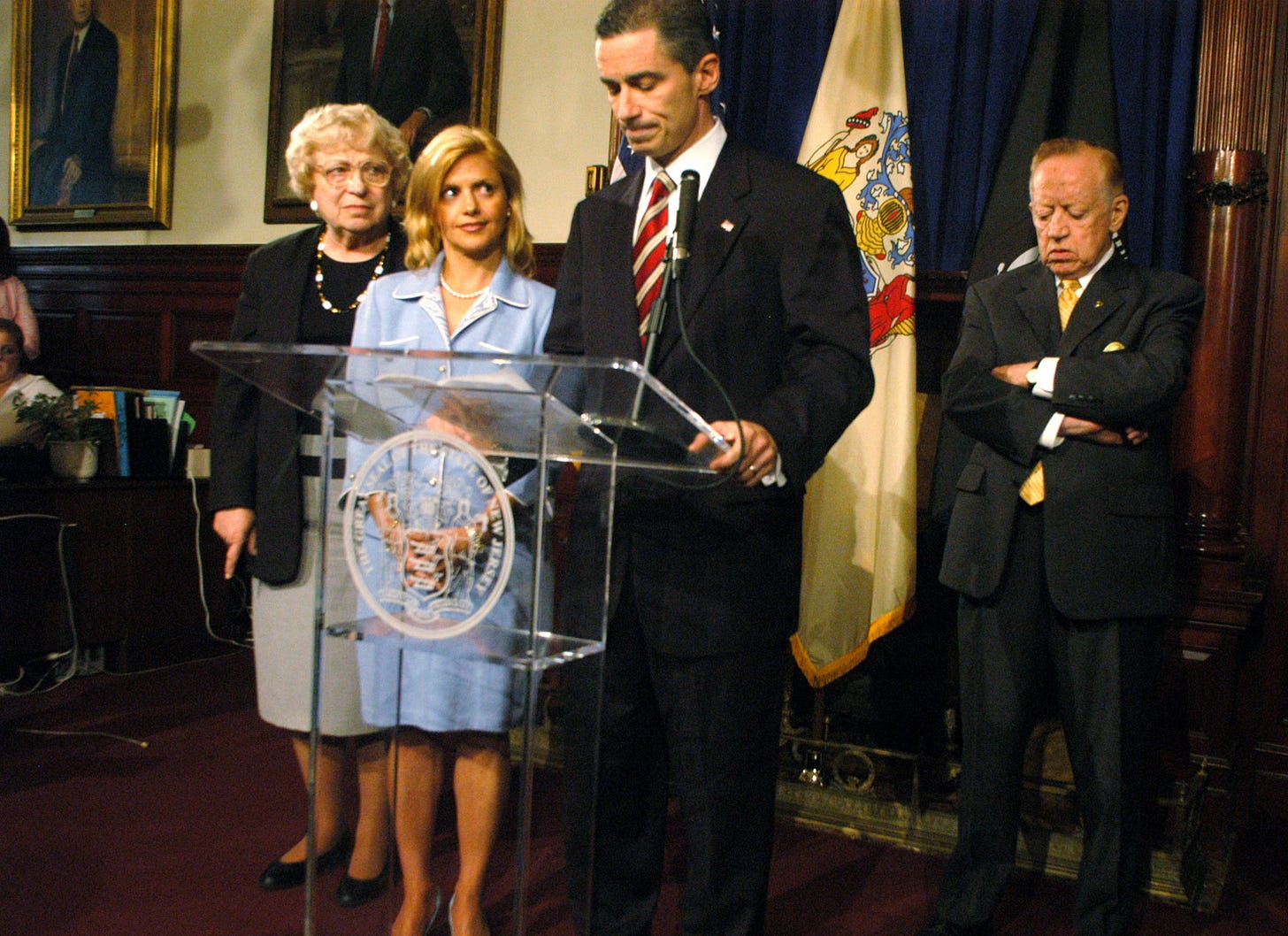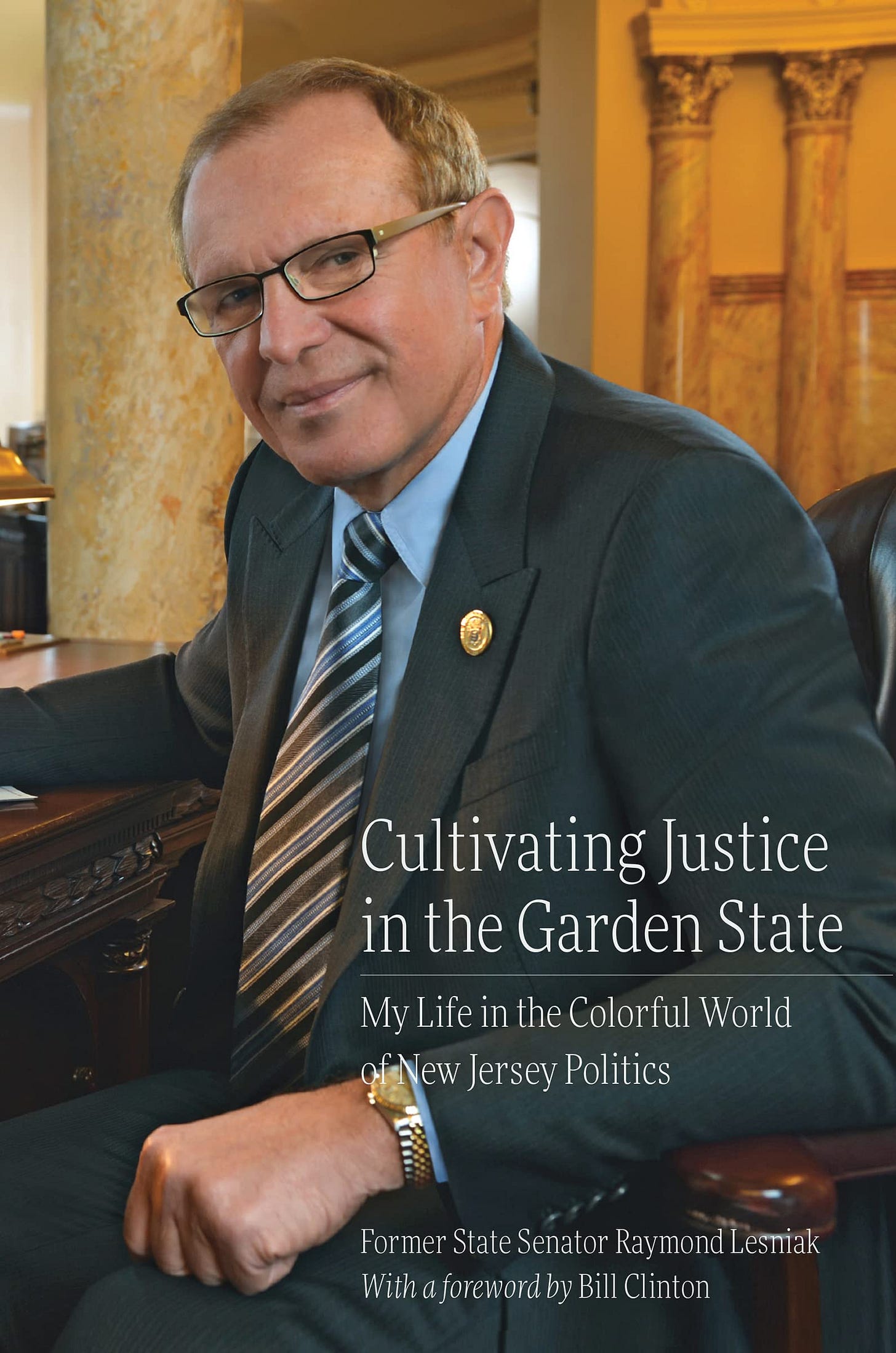“Anything Can Happen in New Jersey”
A Former State Senator Wonders if Charles Kushner Was Involved in the Sex Scandal that Brought Down Governor Jim McGreevey
My eye was caught by a Vanity Fair headline a few days ago:
“Did Jared Kushner’s Father Set Up Former N.J. Governor Jim McGreevey?”
Charles Kushner (center) wades though the media with his legal team and wife to the U.S. District Courthouse August 18, 2004 in Newark, NJ. (Photo by Chris Hondros/Getty Images)
This was far from the first time I had heard rumors about Charles Kushner being involved in the McGreevey scandal. In fact, in Kushner, Inc., I wrote about the strange synchronicity of the simultaneous downfall of two major figures in Jersey politics:
It’s a view held by many close to the case that Charlie would have beaten all the other charges were it not for setting up Billy Schulder with a prostitute. “I think [the sting] put him in prison,” said Alan Hammer. “He gave up the moral high ground. [He] couldn’t stand before a jury and tell them what a good person he is after that.”
But there may have been another reason Charlie did not fight the charges. Within weeks of his arrest on July 13, a one-page document from Chris Christie’s office sputtered out of Charlie’s fax machine. Because of Charlie’s strong aversion to office clutter, the fax machine was outside his sumptuous personal space, in a public area where his assistant, Valerie Grundig—and anyone passing by—could easily read whatever had been sent. While there is no reason to believe he saw the fax, Josh Kushner was in the office then, on summer break before he started college at Harvard. (In one of life’s great ironies, Jared was interning for Manhattan District Attorney Robert Morgenthau.)
The facsimile made for astonishing reading, according to one person who saw it. It contained a reference to Charlie’s alleged alias, John Hess, and to claims that Charlie was bisexual. (Benjamin Brafman, Charlie’s criminal attorney at the time, said he had seen everything Christie’s office sent about the case and had no recollection of the fax. He also disputed the allegations. “We carefully investigated these matters fifteen years ago and found zero credible evidence to support them,” Brafman said.) Such allegations would not be devastating for many people, but for Charlie, at the apex of a closed society predicated on the importance of family and of regenerating the blood line, it would have been a disaster. “The social stigma would be enormous,” said Michael Berenbaum, the Jewish studies scholar, who did not know Charlie and had never heard these allegations. “Culturally, that would be something that at that point in time, in that generation, would be very difficult to accept . . . and with lots of consequences.” …
[Charlie] was not going to be publicly humiliated, and he wasn’t going to let his wife be mocked. And so the Kushners huddled, cried, and then strategized. Charlie and Seryl appeared to hide little from their children, which appalled one of the Kushner lawyers so much that, atypically, he talked about it. According to one source, Jared sat in on a meeting in which prosecutors spelled out precisely the range of allegations that would come out if the case went to trial. The prosecutors told Charlie and Seryl they would pursue a so-called “speaking indictment,” which meant they could bring up all the evidence they had on him in open court, even details seemingly unnecessary to argue the charges. (Brafman denied any knowledge of such a meeting.)
The family must have realized Charlie’s public career was over. They had to think quickly and find a way to make the best of a horrible situation.
A day or so after that fax came in from Christie’s office, Charlie, dressed in a golf shirt and jeans, gathered his top advisers in his office. The group, according to someone there, included Seryl, Richard Stadtmauer, head of land development Jeffrey Freireich, chief operating officer Stuart Epstein, and Kevin Swill, president of a Kushner Companies subsidiary. Charlie had tried to make a deal in which he alone took the fall, according to Hammer, but Christie would not accept it. Charlie told the people in that room that Christie insisted he would have to tell the government everything he knew and plead guilty to aiding in the preparation of false tax returns—meaning that, in due course, the government could indict other Kushner Companies executives for the same crime.
Seeing no way out, Charlie rolled. In front of the group, he called New Jersey Governor Jim McGreevey. “Jim, I’ve got to give you up,” he said, according to someone who was present. “You’re going to be outed any day now. Chris Christie wants you. He’s using me to get to you, and he knows everything.” (Brafman denied Kushner was asked to cooperate in an investigation of McGreevey.) It was unclear what exactly Charlie meant by “everything,” but in the coming weeks, the strangely synchronized downfall of these two New Jersey machers would become an object of fascination and whispered speculation in New Jersey political circles. A lot of that gossip was about Golan Cipel, the young Israeli with whom the ostensibly straight, married governor had carried on an affair and whom he had put on the government payroll. (At the time, Cipel hadn’t even passed a background check.) Now Cipel was allegedly trying to extort McGreevey, by threatening to file a sexual harassment suit against him. The New York Times reported that McGreevey’s advisers speculated that Charlie, who’d quarreled with McGreevey on a conference call because the governor refused to contribute a state subsidy to Kushner’s bid to purchase the New Jersey Nets, was using Cipel to punish McGreevey.
Ultimately, Cipel’s efforts were irrelevant. On August 12, 2004, less than a month after getting that call from Charlie, McGreevey announced his resignation with an emotional speech in Trenton, New Jersey, saying, “My truth is that I am a gay American.” (The resignation overshadowed McGreevey’s admission just a month earlier that he was an unnamed official at the heart of a federal indictment for a pay-to-play scheme. McGreevey claimed not to have been involved in that, and was never charged.)
Six days later, and just over a month after he’d been arrested, Charlie pleaded guilty to eighteen counts of aiding in the preparation of false tax returns, retaliating against a cooperating witness (Esther), and making false statements to the Federal Election Commission.
Brafman later denied to New York magazine that Charlie had had any role in McGreevey’s undoing: “I want to be very clear about this. . . . Charles Kushner had absolutely nothing to do with the recent controversy surrounding the governor and Golan Cipel. I was with Charles Kushner when he learned through the media that the governor was going to resign. He was stunned and visibly upset for his friend.”
New Jersey Governor James McGreevey addresses the media with his wife Dina at his side on August 12, 2004 in Trenton, New Jersey. McGreevey announced his resignation would be effective as of November 15. (Photo by Laura Pedrick/Getty)
The byline of the Vanity Fair piece caught my eye: It was an excerpt from Cultivating Justice in the Garden State: My Life in the Colorful World of New Jersey Politics, a new book by longtime New Jersey politician Ray Lesniak, who served in the N.J. State Senate from 1983 to 2018.
I had spoken with Lesniak back when I was reporting my book. After such a long career in Jersey politics, there were few who knew that world—and the complicated dynamics between Kushner, McGreevey, and Chris Christie—better than him.
Now, with the recent news of Jared Kushner’s $2 billion investment by MBS—against the advice of a panel of advisors, no less—and my own work to uncover the reasons behind that decision (see Part One, Part Two, and Part Three), I thought it was the perfect time to ask Lesniak about what he makes of the deal and the current state of the Kushner family legacy.
Here is our conversation, edited and condensed for clarity:
WARD: In my book, I talk about the bid to purchase the New Jersey Jets. And I talk about this idea which you are getting at that Cipel was trying to extort McGreevey. I [mention] the New York Magazine report of McGreevey's advisors speculating that Charlie, who'd quarreled with McGreevey on a conference call because the governor refused to contribute a state subsidy to Charlie's bid to purchase the New Jersey Nets, was using Cipel to pressure McGreevey. And then I say, ultimately, Cipel’s efforts were irrelevant because then McGreevey does his “my truth” speech. But I then say in parenthesis: “The resignation overshadowed McGreevey's admission, just a month earlier, that he was an unnamed official at the heart of a federal indictment for a pay-to-play scheme. McGreevey claimed not to have been involved in that and was never charged.”
And then I say, “Six days later, and just over a month after he'd been arrested, Charlie pleaded guilty to 18 counts of aiding in the preparation of false tax returns, retaliating against a cooperating witness, and making false statements to the FEC. Ben Brafman later denied to New York Magazine that Charlie had had any role in McGreevey's undoing: ‘I want to be clear about this. Charles Kushner had absolutely nothing to do with the recent controversy surrounding the governor and Golan. I was with Charles Kushner when he learned through the media, the governor was going to resign. He was stunned and visibly upset for his friend.’”
So basically what you are saying, Ray: Is that [what Brafman said] not true?
LESNIAK: Well, what I am saying is that the circumstantial evidence, if you will, points to Charlie Kushner being behind Golan Cipel more than [that he was] not involved in it [the alleged extortion] at all. At the end, I ask the question and then I say, “ On ne sait jamais”—one will never know.
WARD: Well, what about the [corrupt pay-to-play] scheme that I talk about? I do remember from my reporting all those years ago that it was important and relevant, according to sources, that McGreevey never had to participate in any litigation around that. You do talk about it in the excerpts, where there was a code name.
LESNIAK: Oh, Machiavelli—yes.
WARD: I mean, I seem to remember from my reporting that this whole [pay-to-play] scheme was actually potentially a big deal [for McGreevey].
LESNIAK: Oh, it was. Oh, absolutely. And as a matter of fact, I didn't specifically relate it, but I did say that [the late political advisor] Jamie Fox, who had a Svengali-like influence over McGreevey, was concerned that that this controversy would lead [Chris] Christie to coming down with more things against McGreevey and—I didn't specifically say this—but [that] McGreevey wouldn't be able to survive an impeachment proceeding in the legislature. It was that hot. [But] the Cipel thing was amplified by the press who basically said (and it was repeated over and over again) that Cipel was head of Homeland Security when actually he was McGreevey’s liaison to Homeland Security—and that became the belief in the political world. And they just highlighted it, particularly right after 9/11. And so it was more than just the Cipel controversy, but a fear that, if McGreevey didn't get out of town, Christie was going to come after him even more so [because of the pay-to-play scheme].
WARD: Right. But the question mark in all of this is the role of Charles Kushner.
LESNIAK: Well, of course. I had no indication of that until I heard about the Touro College request to make it go all away. This lawyer who was representing Cipel (who, by the way—has anybody reached out to him? I'd like to hear his take on this. Of course he probably wouldn't say anything) [said] that [the extortion] would all go away if McGreevey approved the application for Touro College's medical school in New Jersey that Kushner wanted to name after his mother. And that's what got the ball rolling. And when I went in to see McGreevey and told his chief of staff Jamie Fox what happened, that's when Fox said and pointed [his] finger to me, “Kushner.” That's what got me thinking, putting all the all the dots together and presenting quite a circumstantial case that Kushner was behind this. We'll see if he has anything to say about it. That's for sure.
WARD: But then following that through, let's say it was Kushner rattling the cage. Was there any evidence that Kushner had anything to do with this other scheme? The pay-to-play scheme?
LESNIAK: No, I don't think so.
WARD: Right. So it's possible that McGreevey then resigned because of something that actually had nothing to do with Kushner?
LESNIAK: Well, that's correct. I believe I said that.
WARD: Yeah, you did.
LESNIAK: <Laughs> Yes. It was more Christie looking over his shoulder than anything.
WARD: I got you. And now tell me, Ray. I know you've known all of this for a long time. We talked a lot a few years ago. You could get some angry phone calls. So why talk so freely now?
LESNIAK: I've gotten many in my time. I was the one who sponsored licensing legislation and drove organized crime out of the garbage disposal business. You can imagine what I got during that period of time.
WARD: What's your relationship with Charles Kushner today?
LESNIAK: Haven't spoken to him in years. Although when I met with him subsequent to this over [at] McGreevey’s house that he had with his partner at the time, Charlie Kushner was a Dr. Jekyll and Mr. Hyde personality. He is so nice and pleasant and soft-spoken, but—and I didn't mention it in the book—a developer that he came down [on] like a ton of bricks was Carl Goldberg, Roseland Development. They were both vying for the same development in Perth Amboy, and Charlie Kushner felt that it was his because of his real support for McGreevey. And Goldberg was competing and Goldberg was a supporter of McGreevey as well. And [Kushner] went on this diatribe with all kinds of profanity against Goldberg and threatening him with everything—destroying him if he didn’t withdraw his competition. That was an eye-opener.
And obviously there’s the setup of his sister's husband with a prostitute. So, as I write in my book, he's capable of anything—which puts him backing Cipel to get back at McGreevey even more likely. It wouldn't be shocking to anybody if that were the case.
WARD: You've been around New Jersey politics and you are writing about a period of time where Charlie Kushner's fortunes were going to the bottom. And, right now, your book is coming out in a week when his son has just received $2 billion from the Saudi crown prince to invest in his fund. Charles Kushner, in an extraordinary twist of fate, is not only pardoned but is even richer than he was when you and I spoke after his building, which looked disastrous, got saved. This was a quintessential New Jersey family, which is why you and I talked about this. They were very embedded in New Jersey politics, as are you. What do you and the people around you in New Jersey think of all of this?
LESNIAK: Well, first of all, let me preface this by saying anything can happen in New Jersey and in New Jersey politics. And I think at least four times, maybe even five, I say in my book, “Only in New Jersey.” As an example, recently—less than two months ago—I found out that my campaign manager, while he was working for me, pled guilty to plotting somebody's murder. And [this had happened] while he was working on my campaigns and then was negotiating apparently with the federal government a plea deal while he continued to work as if nothing happened. He led a double life. This is New Jersey at its at his weirdest and craziest. So the Charlie Kushner affair is just one of many that I myself have witnessed.
WARD: When I spoke to you earlier, you were chuckling about the headline of the excerpt describing Charles Kushner as “Jared Kushner's father.” Can you explain why that's so funny?
LESNIAK: Because it's all about Charlie Kushner. Jared Kushner was not involved one bit, but Charlie Kushner is no longer news. And Jared Kushner, because of the association with Trump and his activities, is in question. So that tie-in obviously made it more newsworthy than if it had been Charlie Kushner.
WARD: Yes. I got you. I mean, having reported the book all those years ago, the idea that Charlie Kushner could be outdone in the news cycle, given the kind of character he is, is extraordinary, actually.
LESNIAK: Oh yeah. Without a doubt. This will put him back in play, I'm sure.
WARD: Exactly. Ray, thank you so much.






